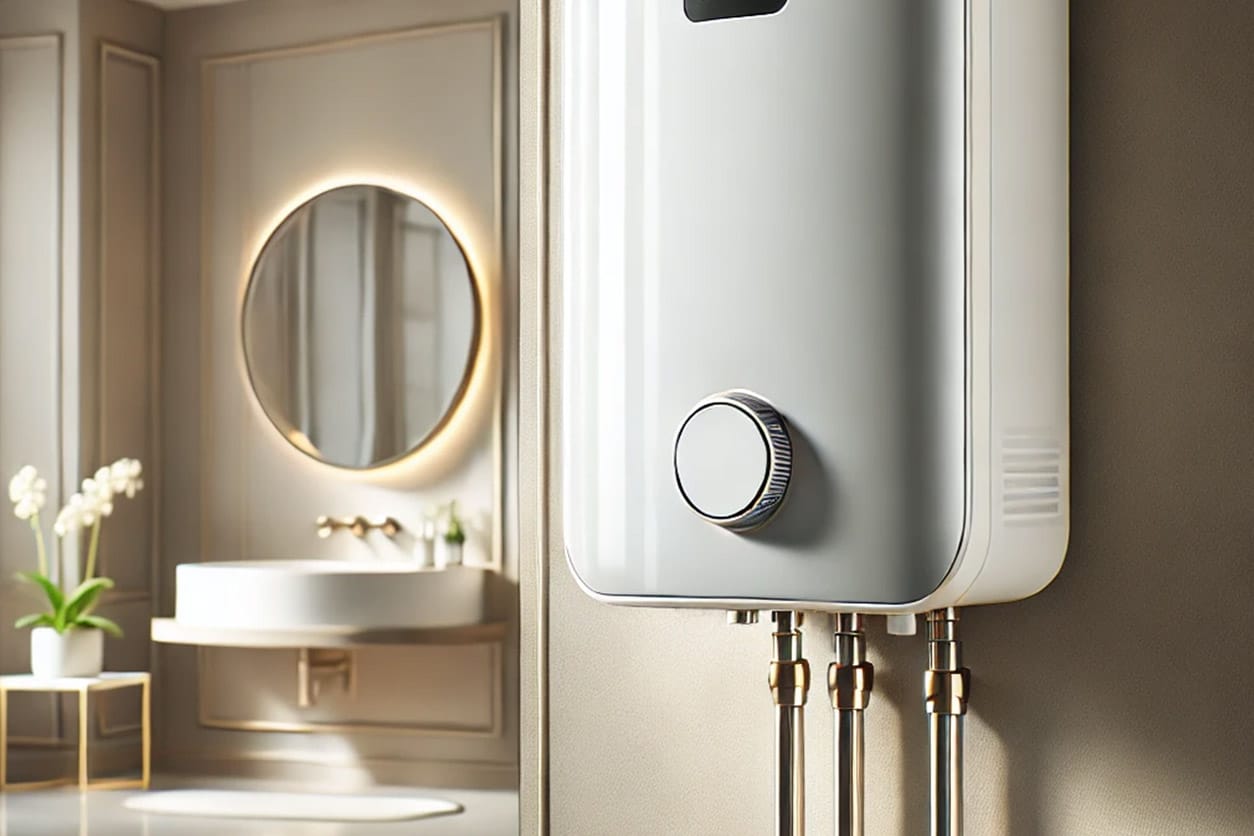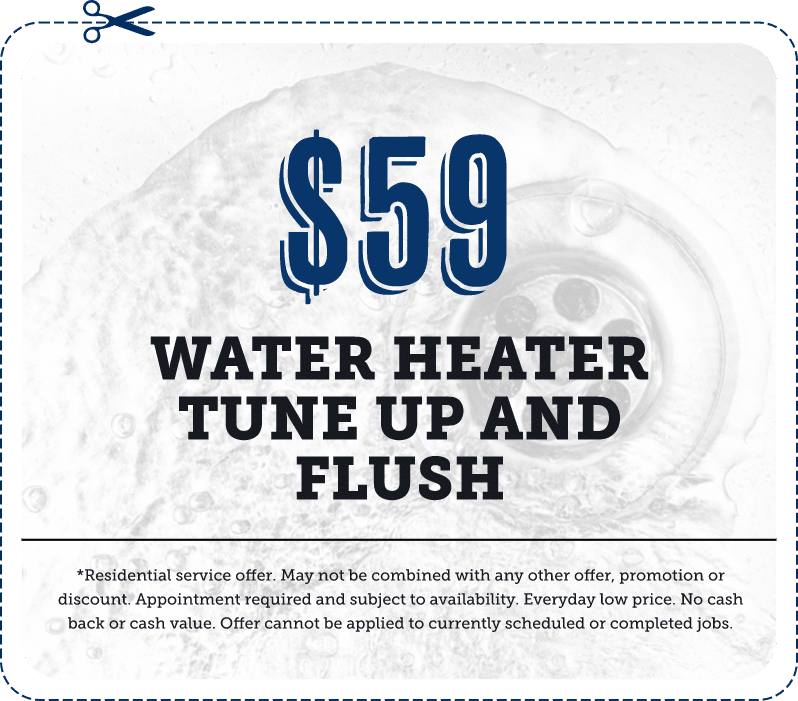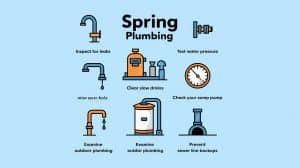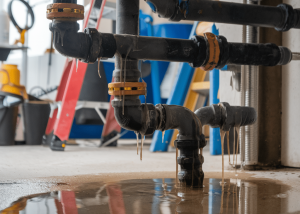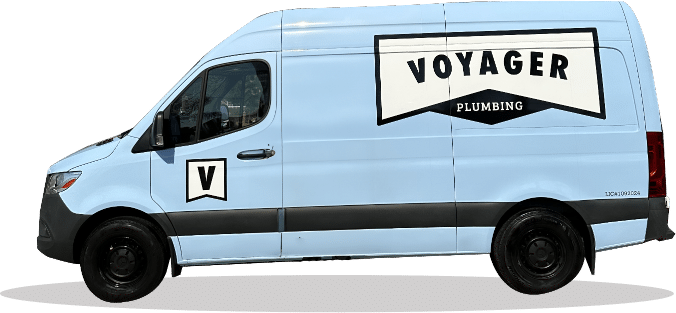If you’re thinking about upgrading your home’s hot water system, you’ve probably come across tankless water heaters.
These compact, energy-efficient units are becoming a popular choice for many homeowners. But what exactly is a tankless water heater, and how does it work?
In this guide, we’ll explore everything you need to know, from how they operate to their advantages and disadvantages, and what to consider when choosing the right model for your home. Let’s dive in and find out how a tankless water heater works.
How a Tankless Water Heater Works
A tankless water heater, also known as an on-demand water heater, provides hot water exactly when you need it, without the need for a bulky storage tank. Instead of constantly heating a large volume of water like a traditional water heater, a tankless model heats water only as it flows through the unit.
Here’s how a tankless water heater works:
1. Water Flow Activation
When you turn on a hot water tap, cold water flows through a pipe and enters the tankless unit. A flow sensor detects the water movement and signals the control panel to start heating.
2. Heating Process
The control panel either ignites a gas burner or activates an electric heating element (depending on your model). As the water passes over the heat exchanger, it absorbs heat and warms up quickly.
4. Temperature Control
Sensors monitor the water temperature as it flows through the heat exchanger. If the water isn’t hot enough, the control panel adjusts the power output to maintain the desired temperature, ensuring you get a steady supply of hot water, even if other taps are running.
5. Hot Water Delivery
Once heated, the water flows directly to your faucet or appliance. Unlike traditional heaters, there’s no waiting around for a storage tank to fill up with hot water.
6. Shut Down
When you turn off the hot water tap, the flow sensor detects the stop in water movement, and the unit automatically shuts down. This on-demand feature saves energy by only heating water when necessary.
The Types of Tankless Water Heaters
Now that you have a grasp on how a tankless water heater works, let’s look at the types of water heaters. There are two main types of tankless water heaters: electric and gas-fired. Each has its unique features that might make one more suitable for your needs.
1. Electric Tankless Water Heaters
Electric tankless heaters use electric heating elements to warm the water. They are typically smaller, easier to install, and have lower upfront costs compared to gas models. They’re ideal for smaller homes or properties without access to natural gas. However, electric models usually offer a lower hot water output and may require electrical upgrades to meet their power needs.
2. Gas-Fired Tankless Water Heaters
Gas-fired models use natural gas or propane to heat the water. They generally provide a higher hot water output, making them a good choice for larger households with high hot water demand. However, they require proper venting to expel combustion gases, which can make installation more complex and costly.
The Advantages of Tankless Water Heaters
So why should you consider going tankless? Here are some of the top benefits:
1. Energy Efficiency
Tankless water heaters are known for their energy efficiency. Unlike traditional models that constantly heat a large tank of water, tankless units only use energy when hot water is needed. According to the U.S. Department of Energy, they can be 24-34% more efficient for homes that use up to 41 gallons of hot water daily, and 8-14% more efficient for homes using around 86 gallons per day.
2. Endless Hot Water
With a tankless water heater, you’ll never have to worry about running out of hot water. These units heat water on demand, ensuring a continuous hot water supply for as long as needed, even during back-to-back showers or when multiple appliances are running simultaneously.
3. Space-Saving Design
Traditional water heaters can be bulky and take up a lot of room, but tankless models are much smaller. They can be mounted on a wall or installed in tight spaces, making them an excellent option for homes with limited space.
4. Longer Lifespan
Tankless water heaters typically last longer than traditional tank models. While a standard water heater might last 10-15 years, a tankless unit can last 20 years or more, offering better value over time.
5. Reduced Risk of Water Damage
Because tankless water heaters don’t store water, there’s less risk of leaks and water damage due to tank failures. This can save you money on repairs and maintenance.
The Disadvantages of Tankless Water Heaters
While tankless water heaters have plenty of benefits, there are some potential downsides to consider:
1. Higher Upfront Costs
Tankless water heaters usually have a higher initial cost than traditional models. However, the savings on your energy bills over time can help offset this investment.
2. Limited Flow Rate
Tankless water heaters can only heat a certain amount of water at a time. If you have multiple taps running simultaneously (like a shower, dishwasher, and washing machine), you might notice a drop in water temperature. To avoid this, you might consider installing multiple units or choosing a higher-capacity model.
3. Complex Installation
Installing a tankless water heater can be more complicated than a traditional unit. Gas models require proper venting, and electric models might need electrical upgrades. Hiring a professional installer is essential to ensure the job is done safely and efficiently.
The Factors to Consider When Choosing a Tankless Water Heater
If you’re thinking about going tankless, here are a few things to keep in mind:
1. Household Hot Water Demand
Consider your household’s typical hot water usage. This will help you select a unit with the right flow rate to meet your needs. A professional can perform a sizing analysis to help you choose the best option.
2. Fuel Type
Decide whether an electric or gas model is best for your home. Electric models are generally easier to install, while gas models offer higher flow rates and are better for larger households.
3. Installation Requirements
Take into account the complexity and cost of installation. Ensure your home’s infrastructure can support the unit you choose, whether it’s electrical capacity for an electric model or venting for a gas one.
4. Energy Efficiency
Look for models with high energy efficiency ratings, like those certified by Energy Star, to maximize your energy savings.
5. Maintenance Needs
Regular maintenance, such as descaling and filter cleaning, is essential for keeping your tankless water heater in top condition. Be prepared for periodic upkeep to ensure your unit runs efficiently for years to come.
Frequently Asked Questions
Below are some commonly asked questions to consider:
1. Do tankless water heaters require regular maintenance?
Yes, tankless water heaters require periodic maintenance, such as descaling to remove mineral buildup, especially in areas with hard water. Regular maintenance helps maintain efficiency and extend the heater’s lifespan.
2. Can I install a tankless water heater myself?
While it’s possible for a skilled DIYer to install a tankless water heater, professional installation is highly recommended. Proper installation is crucial for safety, efficiency, and warranty coverage, especially for gas models that require venting.
3. Do tankless water heaters work during a power outage?
Electric tankless water heaters will not function during a power outage. Gas models also typically require electricity to power the control panel and ignition, so a backup power source, like a generator, may be needed.
Now you know how a tankless water heater works—it’s time to get one!
Tankless water heaters provide a modern, efficient way to enjoy hot water on demand. While they come with a higher upfront cost and require thoughtful consideration of your household’s needs, their benefits—like endless hot water, energy savings, and space efficiency—often make them a smart investment.
If you’re ready to make the switch, keep the above factors in mind when choosing the best tankless water heater for your home. With the right unit, you can enjoy hot water whenever you need it without the waste and bulk of traditional models.
Speak with a plumber to help you install a tankless water heater in San Diego today.

